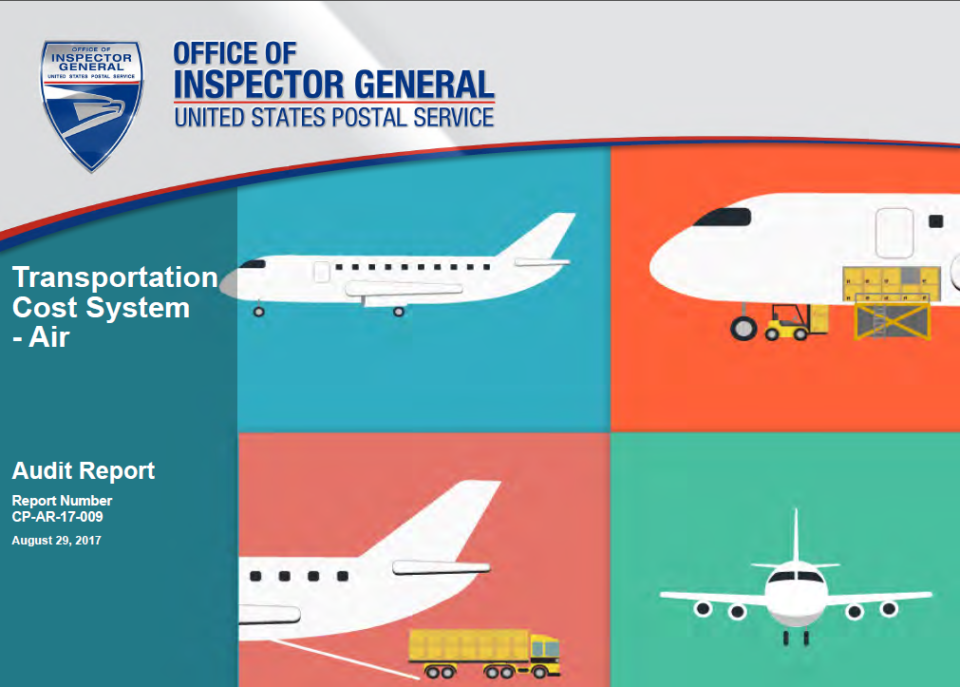Transportation Cost System ― Air
Background
In fiscal year (FY) 2016, the U.S. Postal Service incurred total transportation contract costs for air, highway, rail, and water transportation of about $7 billion. Of that amount, about $2.5 billion (35 percent) was composed of air transportation costs.
The Transportation Cost System (TRACS) – Air is a statistical sampling and data collection system that provides information for the Postal Service to allocate air transportation costs to mail products and services and set prices. During TRACS – Air tests, data collectors count and record mail product type, shape, and other characteristics in an automated system. In FY 2016, the Postal Service conducted 5,532 TRACS – Air sampling tests.
Our objective was to assess the accuracy and reliability of TRACS – Air sampling data. We did not review the cost allocation process during this audit.
What the OIG Found
The procedures the Postal Service used in FY 2016 to determine their sample size sufficiently supports their ability to attribute costs from TRACS – Air and the sampling data is generally accurate and reliable; however, opportunities for improvements exist. Specifically, the Postal Service did not always follow policies and procedures when conducting TRACS – Air tests. Issues identified included:
- District managers inappropriately canceled 143 of 946 (15.1 percent) tests that should have been rescheduled.
- Postal Service personnel could not always support completion of required training activities for data collectors due to problems with the training management system. For example, about 94 percent of data collectors did not have all records in the system to support that they completed the required training. Policy requires that training must be completed prior to conducting TRACS – Air tests.
- During eight of nine site visits, the OIG observed 22 instances where data collection policies and procedures were not followed, such as five instances where data collectors did not select sample items over the entire prescribed time segment.
These control weaknesses occurred because district managers provided inadequate oversight of data collectors and training activities. Postal Service Headquarters personnel rely on district managers to provide oversight such as verifying data sampling and ensuring completion of training activities.
These issues increase the risk of collecting inconsistent, inaccurate, and unreliable data, potentially leading to inaccurate cost attribution and decision making.
The Postal Service also misclassified 101 of 516 (19.6 percent) rescheduled tests in FY 2016. This occurred because defaults in the software do not correctly annotate the tests when they are rescheduled online by district managers and downloaded to the laptop by data collectors. When rescheduled tests are misclassified, the Postal Service is unable to do verification checks to prevent sampling error and bias. Management does verification checks to ensure that rescheduled tests are performed exactly one week later, as required by policy. Management stated they started using a different data source on July 6, 2017, for verification checks rather than relying on the original erroneous data source.
In addition, data collectors did not always properly select TRACS – Air sample mail items to count and record mail characteristics used to allocate air transportation costs to mail products and services. After we found 49 of 56,532 (0.1 percent) mail items sampled in FY 2016 did not match the required mail type to be tested, the Postal Service identified a coding error in the program used to verify TRACS – Air sample items. These 49 items should have been excluded from the sample data used to calculate the cost estimates.
Incorrect sampling can lead management and the Postal Regulatory Commission to rely on incorrect information when determining cost coverage and, ultimately, setting Postal Service prices. Since management corrected the coding issue during our audit, we are not making a corresponding recommendation.
What the OIG Recommended
We recommended management:
- Reiterate to district personnel the importance of the data validation and approval process.
- Develop a system to monitor and hold managers accountable for ensuring completion and documentation of training activities.
- Provide data collectors with refresher training on policies and procedures.
- Modify data collection software to accurately annotate tests as rescheduled.
- Periodically review analytics software to ensure it is functioning properly.

